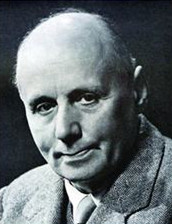Interview| Pelham Lindfield Roberts: Converting Idealism into Action
Issue date:2018-03-21The vision of UWC in the future is converting this idealism into action.
Late last year, UWC Changshu China announced that Pelham Lindfield Roberts would become the College’s second Principal following Robert Clarence’s retirement in August 2018. Pelham and his wife Ulrike are well-known to members of the UWC movement from Pelham’s time as Head of UWC Mahindra College of India and, earlier in his career, as a teacher of Peace and Conflict Studies and History, a House Parent and Head of the Lifeboat Service at UWC Atlantic College.
Pelham’s achievements during five years at Mahindra College have been considerable. He has focused on curriculum development, including the concept of an educational ‘core’ and innovative courses in Systems Thinking and People, Nations and Cultures, which seeks to bring together more deliberately the IB Diploma and UWC’s mission; work to build a more harmonious and healthy college community that is conscious of its position and its responsibilities within India; and support for the remarkable Akshara programme, which has created a partnership between the College and its local communities and brought about significant and lasting change.
In this issue, we had the opportunity to interview Pelham and get to learn more about his UWC journey, his vision of UWC Changshu China and UWC movement as a whole.
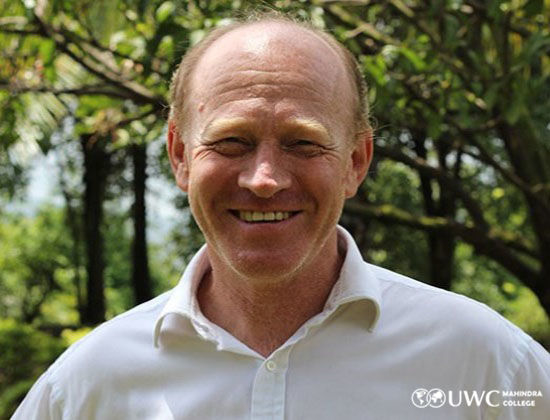
Pelham Lindfield Roberts, new Principal of UWC Changshu China in Aug. 2018
23 years of UWC Journey
Interviewer: Can you tell us about your UWC journey?
Pelham: My UWC journey started in 1995 when I joined the faculty of Atlantic College (UK). Alongside tales of the ghost of Lady Ann waiting in the castle tower for her husband to return from the crusades, were the stories of 15 Chinese students who joined Atlantic College in 1973. By the time I joined, 22 years later, it was still a challenge to convince University Admissions Officers of the value of the IB. UWC’s around the World were playing a pioneering role in developing new subjects, such as Peace and Conflict Studies, which was one of the subjects I took responsibility for, at Atlantic College and within the IB. I had almost joined the faculty of UWCRCN (in Norway), which opened in the same year, and would thus have met UWC Changshu’s Founder and Chairman a few years earlier; that friendship was to wait for a later time. In addition to teaching, I ran the lifeboat, organized projects to the Middle East, and, with my wife Ulrike, we were House Parents of a Student House. A decade later I moved to Kurt Hahn’s first school in Germany and then to UWC Waterford Kamhlabain Swaziland, where Ulrike taught German and I started to do academic research. After two more Headships outside of the UWC movement in South Africa and the USA, I was appointed to be Head of UWC Mahindra College. At UWC Mahindra College I inherited innovative work that had led to the World Studies Extended Essay, a project designed to meaningfully develop the knowledge, understanding and skills needed by 21st century leaders.
Interviewer: What achievements are you most proud of as the Principal of UWC Mahindra? What are the most striking changes you would say you have seen?
Pelham: I am most proud of taking existing innovations forward. I was fortunate to have inherited a wonderful vision fromthe early leaders of the College in the location of the college in rural India, this created the possibility for students to engage with a wide diversity of people and contexts beyond the campus. We are not just a bubble on the top of a hill, educating 240 students. We are a catalyst for education, for social justice, for the values of the UWC movement.We influence the education of young people in the valleys around the college in rural India and they influence our students. I have done what I can to make sure this potential is realized. I hope more and more people come into contact with the values of a UWC education. We hope that there are two positive results: impact on our students and impact on other people.

Pelham receiving a donation from Mr. Anand Mahindra (2nd from left) for funding student scholarships
Another innovation I hope we have developed is about the pedagogy of learning. Students are learning more and more in the real world, engaging with real world problems, real world issues, and not just learning facts in school text books, and still achieving academic excellence, whilst gaining knowledge and understanding through real situations, asking questions, seeking answers to problems, collaboratively, creatively, trying to take action, to do something rather than just to be passive. These things have been more and more successful at Mahindra College; we have been developing our ability to embed learning through experience; developing the empathetic, creative social intelligence needed by leaders, whilst enhancing the knowledge gained by IB students across their chosen academic subjects.
Vision of UWC Movement
Interviewer: In Changshu, we call our extracurricular activities as Zhi Xing, putting knowledge into practice. I am sure in this aspect, you will be able to bring a lot of experience to us. My next question is what still surprises you about the UWC movement after being in the movement for so long?
Pelham: The students we bring together never cease to amaze me. When I joined Atlantic College In 1995, the IB was just becoming known. It still had to justify itself, to articulate itself, within national systems. In the early years UWC was inventive,creatively bringing students together to study, from so many diverse backgrounds. Now because of globalization we can find the same diversity in international schools, in capital cities and in second and third tier cities all over the world. It's not unusual to have schools here and there with 60 nationalities. The amazing thing about UWC students is the motivation and idealism, which brings them together. It's not just because their parents happen to be working in the same city that their children end up studying together, or because parents choose a school for their children. The students come together, drawn by a sense of adventure and idealism, to study and learn from each other as a choice they make, with purpose. This is the most important thing about a UWC education. The greatest influence on a student in any school comes from their peers. No matter how good their teachers may be, the single most significant influence comes from the person sitting on one side or the other in a classroom, sharing a room, or engaged in a project. Our students decide to learn in a UWC because they want to explore, ask questions and understand; because they are inquisitive. I think that is the wonderful and still surprising opportunity in UWC. The more and more we can build our education around the experience of our students, the more valuable it will be. I want to capitalize on this!
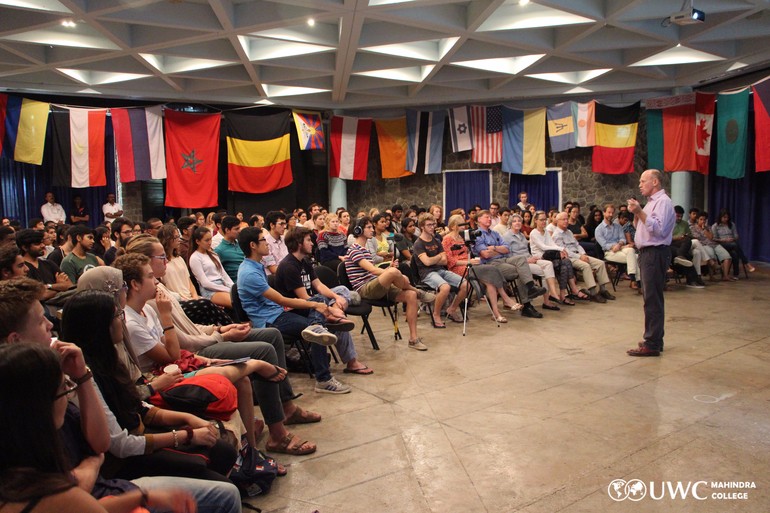
Pelham addressing a College Meeting
Interviewer: Right. I think another aspect to me is very unique and exciting is that UWC brings together students not just from different countries but also from different backgrounds whether it is religion or different socio-economic background.
Pelham: You are absolutely right, and that is the important part of bringing different perspectives together, teaching our students leadership skills, listening to and learning from others who are different, who have different perspectives, learning to interact, to communicate, to understand, to value. In other international schools, that intention does not exist, students haven't gone there specifically to engage with people who are different. UWC provides this unique opportunity for students to learn and to lead.
Interviewer: Absolutely! This reminds me of what the President of Harvard Drew Faust said at her last freshman convocation speech in 2017 in which she expressed the same ideas. She said that: “many of the most important ideas will not come from a professor or a lab or a bookor an online assignment, but will come from those sitting next to you right now. Many new perspectives you will embrace will be the result of your interactions with your peers. That is the importance of diversity of backgrounds, experiences and interests.”
Pelham: Kurt Hahn called these two years or in Changshu’s case for some, three years “the age of idealism”. This is a very important period for young people to experiment and develop. It is an age when all young people to a greater or lesser extent try new things, whether they're on their own, or with others, they experiment, they take risks and they learn in the process. In UWC we create the context for this learning. This is the unique thing about a UWC that we have to maintain. The age of idealism is the time for us to allow our students to explore within the classroom and beyond.
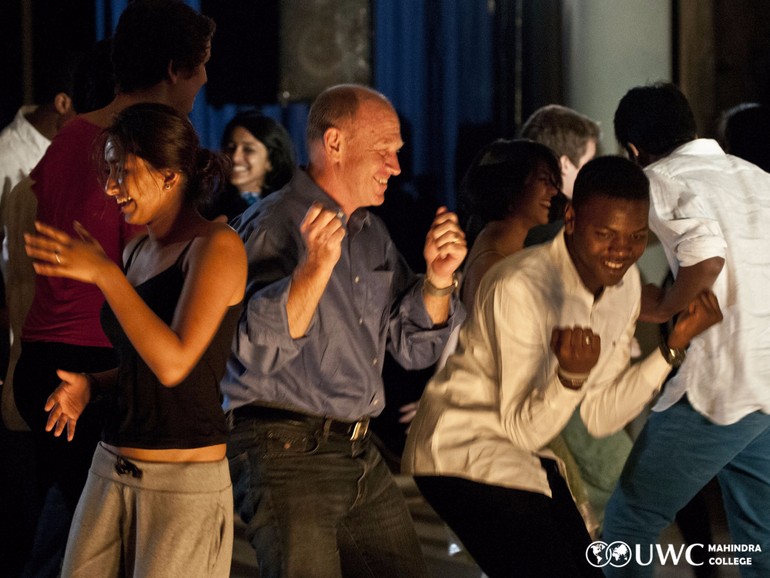
Pelham enjoying dancing with students
Interviewer: So that's the age we call magic age, right?
Pelham: Yes indeed, it is magic and anythingcould happen! As Shelby Davis has said, “the world has dreamers and doers; we need dreamers who do”. It is very important that there are many dreamers. Our job as UWC teachers is to help our dreamers not just to dream, but also to do!
Pelham with UWC philanthropist Shelby Davis, founder of UWC Davis Scholarship Programme and his wife Gale
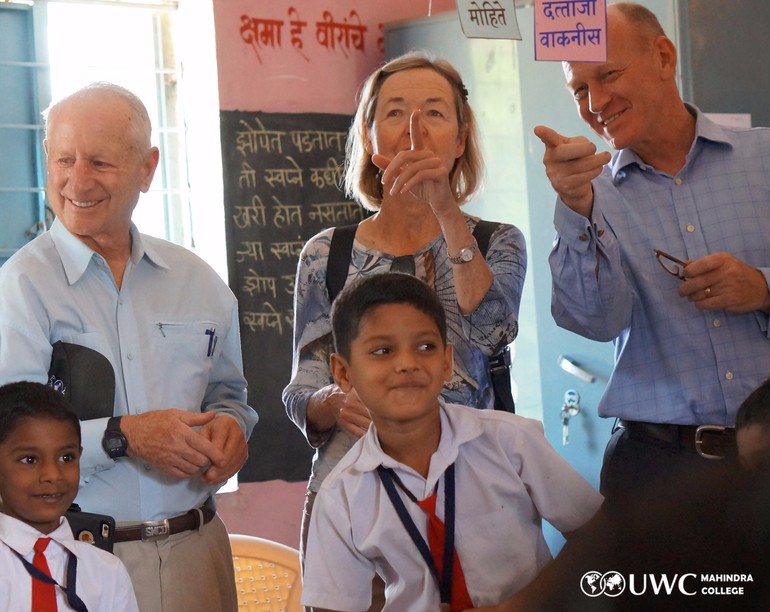
Pelham with UWC philanthropist Shelby Davis, founder of UWC Davis Scholarship Programme and his wife Gale
Interviewer: Right, and become change makers. What is your vision of UWC movement in the future? What are the challenges ahead for UWC?
Pelham: The vision of UWC in the future is converting this idealism into action: Supporting the idealism of our alumni and graduates and converting it into meaningful action, in communities around the world, whatever and wherever the community maybe.The world is in need of the values of the UWC movement to manage the challenges that are looming. The UWC movement was needed in 1962 with the threat of nuclear weapons. This threat is reappearing after the cold war, with new powers, new weapons and new individual and national egos. We need leaders who can go beyond their own egos, who understand technology and politics and psychology, who can challenge those who create enemies to justify their own assumption of power. Such understanding is necessary for young leaders so they can see through the political rhetoric and challenge bigotry. We need our students to challenge prejudice and discrimination and to question the rhetoric of power founded on fear.
When the UWC movement started there was a very strong emphasis on leadership, but in the 1980s and 1990s leadership became an overused cliché. People stopped talking about leadership but now a different kind of leadership is being discussed, leadership which is sustainable, durable, and empowering. That's something we as UWCers have to return to as a challenge, to build a new understanding of leadership for a world that is as peaceful as possible for the largest number and where its resources are shared and renewed not consumed to exhaustion. This interests me as one challenge which lies ahead.
New Journey of UWC
Interviewer: This is something I wish to explore with you further in future. How did you arrive at the decision to move from Mahindra to UWC Changshu?
Pelham: I spoke with Mark Wang and I spoke withmy wife.
Interviewer: I read from the announcement of your appointment that it was a difficult decision.
Pelham: Yes indeed! I did not plan to move. I was very happy at Mahindra, and there is still a lot of important work to do there, but I came to China in July with my son, who was a student at UWC Changshu last year, and what I found was exciting. I think it is an amazing time to be in China, Changshu is a very interesting city and the UWC movement has a role to play. Young people around the world and young Chinese who are idealists will learn together. I cannot imagine another job that is more stimulating in education right now. So it really is a fascinating, interesting and exciting opportunity. Whilst I wasn't looking for a change when I saw the school, Changshu, China, and spoke with Mark and then with my wife, that’s how I arrived at this decision.
Interviewer: Did the experience of your son in anyway influence your decision?
Pelham: Yes, certainly. I see the challenges and the possibilities through the eyes of my son. Geireann has studied in 8 different countries, (Britain, Germany, Swaziland, South Africa, United States, India, China and Norway) on 4 continents and he has lived in 5 different UWC’s as well as in Kurt Hahn’s first school. Understanding the context through his eyes is certainly something that is influential.
Vision for UWC Changshu
Interviewer: What good practices and lessons learned from Mahindra will you bring to Changshu, if you think you can already share some thoughts now, after exchanges with our Board Members and through your experience at the College in the past days?
Pelham: I think we need to get the learning of students into the real world, to engage with real world issues, with the challenges that the world is facing, and also to see those in a local context. I think that's hugely important. I mentioned before, the students should not be stuck in a textbook, they need to be studying the textbook and applying what they learn to the world they see around them. Then they need to be talking with each other about these issues. This is something I learned from Mahindra College. Also making the most of the residential situation, of communities within communities.
Pelham with UWC Akshara Outreach teachers judging an interdisciplinary science project
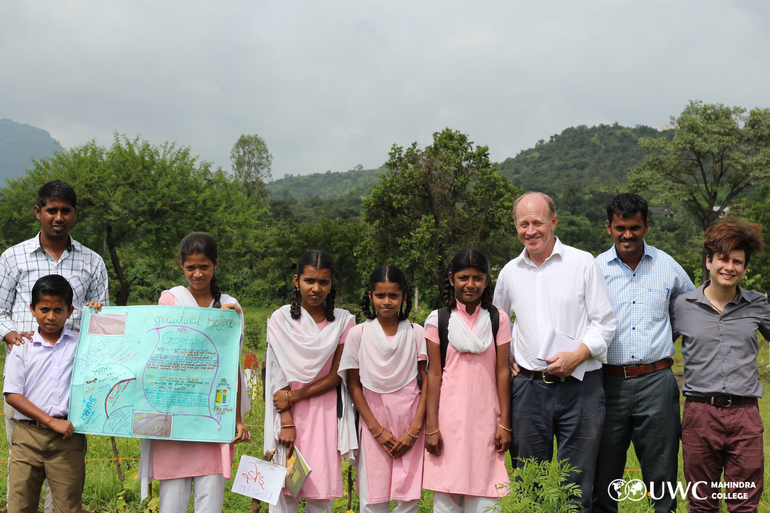
Pelham with UWC Akshara Outreach teachers judging an interdisciplinary science project
I became very aware at Mahindra of the importance of building small communities, within the bigger community. Building these communities in Changshu will be very important, developing a sense of belonging, a sense of membership around different communities and making sure to engage with students in finding solutions. Let them lead and support and guide them, do t leave tem on their own. Our students still need the reassuring presence of adults to ensure their physical and psychological safety, nearby and not overbearing, not too close, and also not too far.
Interviewer: Compared with Mahindra, UWC Changshu is still an infant. So in your mind what is the biggest challenge and the biggest opportunity for Changshu? Actually I think you mentioned something very important when answering the last question about the community as UWC Changshu is much bigger than Mahindra.
Pelham: Community is very important. It’s important to build a common sense of purpose. What Changshu has to do now, is to embed a really strong sense of identity and culture within the community by establishing traditions, and the rites of passage. Societies around the world have their traditions as young people move from childhood to adulthood. So what are the customs and traditions that the community of UWC Changshu will develop? We must work with our students, to identify and create meaningful traditions which will define UWC Changshu throughout the 21st Century, in part spontaneous, in part designed, creating a common shared and purposeful experience.
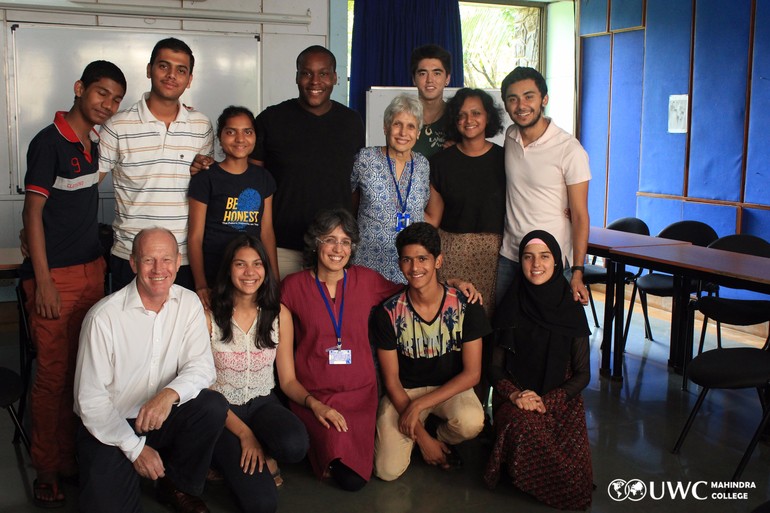
Pelham with patrons for Teach for India and UWC Mahindra students
A student graduating in 2019 and their grand daughter, who will graduate in 2059, should have a shared sense of what it means to have been a UWC Changshu student and we must be creative in developing this culture, inviting different inputs from students and faculty and others, so that those who come to UWC Changshu will have a shared experience, shared traditions, shared challenges, shared opportunities. This will be part of the maturing of the institution, embodying who we are, what we stand for and what matters. UWC Mahindra offers the same experience for those who graduated in 1999 as for those who will graduate in 2019. It comes from the architecture and from the values of those who lay the foundations. It is an exciting opportunity to think what really matters: “What defines my experience as a student? How do faculty guide and motivate and encourage? What defines the experience of our students?What matters, in the context of China and the World in the 21stCentury? What are the values that will establish the enduring character and reputation of the school?
Interviewer: I’m sure our students will be very eager to be part of this tradition building community. So what are your most striking observations during your past a few days at UWC Changshu?
Pelham: It’s a very happy community, there is incredible potential and I have so enjoyed and been inspired by my meetings with people both on the campus and in the official meetings I‘ve had with the Government, with the Party Secretary, with Mayor Shen and others. Their interest and support for UWC is really exciting. It’s that sense of opportunity, magnified through my years of experience in Asia.
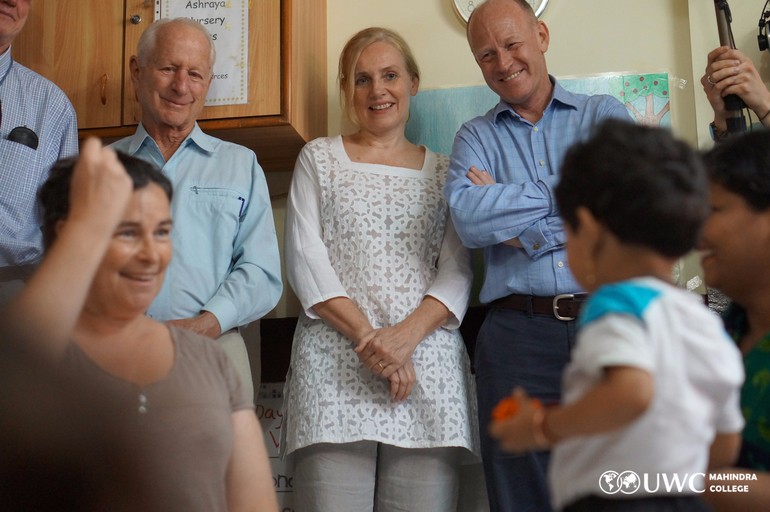
Pelham and his wife Ulrike (middle) with Shelby Davis visiting a local community
Interviewer: What advice do you have to our students of UWC Changshu China?
Pelham: To make the most of the opportunity and let it become the beginning of a life-long journey. Finally, it is very important for me to say that my wife Ulrike is part of my professional journey. I have huge support from her and I don’t think it is something that would be easy to do on my own.
Interviewer: Of course. That’s the most important. Thank you for your advice and thank you for the interview.
Photo: UWC Mahindra







